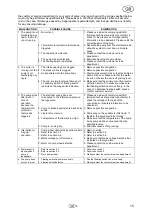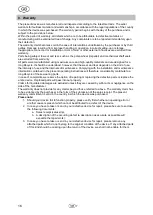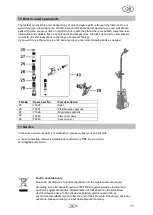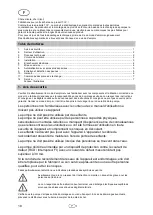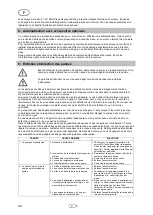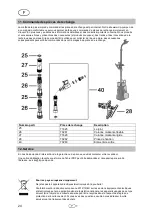
4
Shall the pump continue to suck beyond the automatic cut-out level, the flow switch has to be
operated manually, e.g. by holding it in upright position. Therefore you have to take the cable of the
float switch from the side cable guide (4). Then lock the float switch in the holder provided on the front
pump (13) by sliding the switch from above vertically in the bracket so that the cable points downward.
Only in this operation mode, the minimum suction height can be reached as listed in the tec. data box.
In this condition the pump has to be under constant supervision to avoid dry running.
5.5.
Use as low suction pump
If you want to use the excellent low suction function of the pump (minimal suction level 1 mm) - for
example, for drainage of rooms - you need to remove the dirt guard in front of the suction port at the
pump.
Unscrew the 3 screws (12) and remove the grid. In this operation mode you must consider the
following:
a) Only clear water with a max. particle size of 0.5 mm can be pumped. Since no more dirt guard is
mounted there is a risk that the pump is clogged or blocked and the impellers are damaged.
b) To reach the minimum suction level the pump must operate in manual mode, this means the float
switch must be fixed in upright position (see above). This means that the pump will run perma-
nently as long as it is connected to the electrical mains. This increases the risk of dry running
which may cause severe damage to the unit as a result of overheating. So please do make sure
that the pump is only operating as long as there is enough liquid left to be discharged by it.
c) When starting the pumping-out the water level must be at least 45 mm (see min. self priming level)
so that the pump housing is vented.
d) By dismantling the dirt protective grid and the screws the max. flow rate is reduced about 30%.
In normal operation, you should use the pump always with mounted dirt protective grid to avoid-
pollution and damage to the pump.
In manual operation mode (with fixed float switch) the pump has to be under
constant supervision to avoid dry running.
5.6.
How to position the pump
When positioning the pump, please make sure that the max. submersion depth indicated in the
technical data will not be exceeded. Likewise, please make sure that the minimum self-priming level is
not fallen short of. If everything is properly set, the water level may decrease down to the minimum
suction level once the pump is operating.
Please position the pump on solid ground. Avoid placing it on lose stones or sand. When positioning
the pump, please do make sure that the pump cannot tip over or sink into the ground with its intake
openings. The penetration of sand, mud or comparable matters is to be avoided.
To position, lift up or carry the pump, please use only the carrying handle. If required for lowering or
raising the pump, you may connect a suitable lowering rope to the carrying handle. In no case must
the pressure hose, the mains cable or the cable of the floating switch be used to position, to lift up or
to carry the pump.
6. Electrical connection
The unit is equipped with a mains connection cable and a mains plug. It must only be replaced by
qualified staff to avoid any danger. Please do not use the mains connection cable to carry the pump,
and do not use this cable to pull off the plug from the socket, either. Protect the mains connection
cable and mains plug from heat, oil or sharp edges.
The values stated in the technical details have to correspond to the mains voltage.
The person responsible for the installation has to make sure that the electrical
connection is earthed in compliance with the applicable standards.
The electrical connection has to be equipped with a highly sensitive residual current
circuit-breaker (FI switch): ∆ = 30 mA (DIN VDE 0100-739).
Only use an extension cable with a cable section (3 x 1.0 mm²) and rubber sheath
which at least corresponds to that of the unit's own connection cable (see "Technical
data", cable type) and which is labelled with the relevant abbreviation according to
the VDE (German Association for Electrical, Electronic & Information Technologies).
The mains plug and other connections must be splashproof.
13

















